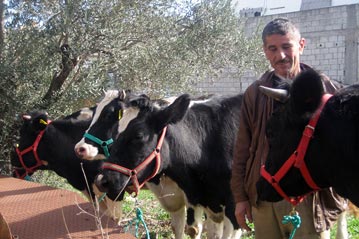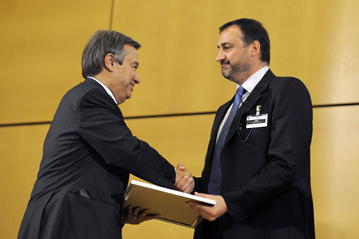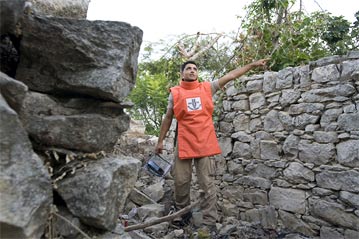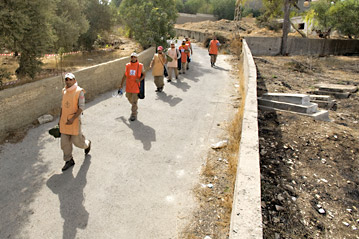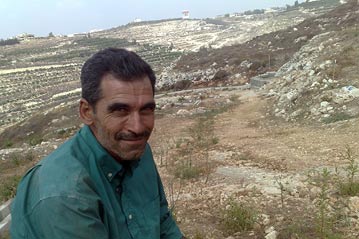Nansen Award helps Italian aid worker "be a stronger voice for a people who have no voice"
Nansen Award helps Italian aid worker "be a stronger voice for a people who have no voice"
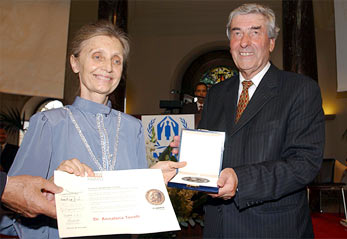
GENEVA, June 26 (UNHCR) - Italian charity worker Annalena Tonelli on Wednesday received the 2003 Nansen Refugee Award at a Geneva ceremony attended by more than 200 dignitaries, among them the President of the Swiss Confederation, Pascal Couchepin.
Also present at the event were scores of Dr Tonelli's family and friends from her hometown in Forli, northern Italy. Her 91-year-old mother sat in the front row to watch her daughter receive the prestigious award in recognition of decades of devotion and selflessness towards Somali communities.
Dr Tonelli became the 59th recipient of the annual award created in 1954 and named after Fridtjof Nansen - world famous Norwegian polar explorer and the world's first international refugee official.
The award, which includes a $100,000 grant, was presented to the 60-year-old lawyer-turned-health worker by the UN High Commissioner for Refugees, Ruud Lubbers, at a ceremony held at Musée Ariana - Geneva's museum of ceramics that overlooks the Palais des Nations, the seat of the UN in Geneva.
Accepting the medal, Dr Tonelli said she hoped the award would help refocus world attention on the problems of Somalia that have long been overshadowed by trouble spots elsewhere in the world.
"For this reason, I am grateful for the decision of UNHCR that has brought attention to my beloved Somalia," she said, "(so that) I may now be a stronger voice for a people who have no voice."
Speaking passionately about her life in Somalia over the last three decades, the 2003 Nansen Award winner talked about her experience in the aftermath of the fall of the Siad Barre regime and the civil war that followed in 1991.
"I have been in the middle of wars and conflicts. I have been a witness of devastating famines, violations of human rights and genocide," Dr Tonelli told the audience at Musée Ariana. "I felt that I would never smile again in my life if I survived those catastrophes."
However, she added, what has kept her going are "the needs of the Somali people and my invincible trust in humanity, my unshakeable hope that men and women of goodwill from all corners of the world like you and me would decide to fight and continue to fight for those who were mysteriously not given the opportunity to live a life worthy to be called life."
For the last 33 years, Dr Tonelli has worked among Somali communities in Kenya and Somalia. With support from friends, she set up a 200-bed hospital in Borama, a remote town in north-west Somalia. The hospital also provides outpatient care for nearly 200 patients a day, among them returned refugees from neighbouring countries such as Ethiopia and Djibouti.
Dr Tonelli is better known for her innovative approach to treating tuberculosis (TB) among nomadic communities. Together with the World Health Organisation, (WHO), she has outlined a "treatment protocol" for TB among nomadic communities. Her treatment method is now being replicated in other parts of the Horn of Africa. With support from friends mainly in Italy, she has raised funds for public awareness about HIV/AIDS and the harmful effects of female genital mutilation that is widely practised by the Somali.
High Commissioner Lubbers praised Dr Tonelli for the incredible sacrifice she has made to bring assistance to one of the most destitute populations in the world, and for her "profound generosity of spirit".
"Today, we are here to celebrate your life, your vocation, the values that have inspired you, and the fruit of your efforts," said Lubbers. "In recognising your achievement, the Nansen Committee seeks to encourage all those involved in activities aimed at relieving human misery, and particularly those involved in protecting and assisting refugees."
The High Commissioner added that the Dr Tonelli was chosen for the award to demonstrate that with limited means, but with passion and limitless energy, many lives can be saved, and many desperate people can be given hope.
Swiss President Couchepin lauded Dr Tonelli's humaneness and efficient management skills that have helped her establish functioning facilities in a country whose basic structures have all but collapsed.
"Madame Tonelli is a good example of humanity and efficiency," said the Swiss leader. He added that the two qualities are vital but are not easily found in the same individual. "But, today, we have the opportunity of meeting someone who is both able to show humanity and demonstrate efficient management skills."
At the ceremony, UNHCR's Honorary Lifetime Goodwill Ambassador, the world-famous soprano Barbara Hendricks, sang, "Sometimes I feel like a motherless child, a long way from home" as part of a moving spiritual.
"Since the foundation of UNHCR, never have we needed the example of Dr Tonelli as we do today," said Hendricks.
Next year, the 2004 Nansen Award ceremony will be held in Barcelona, Spain, as part of the "Universal Forum of Cultures".

